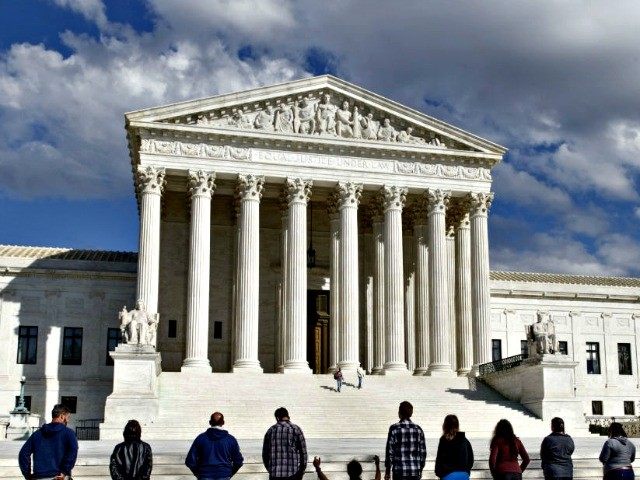On Monday, the Supreme Court released a series of five rulings spanning a variety of issues large and small.
In Taylor v. Barkes, the Court ruled that the Eighth Amendment did not establish “a right to proper implementation of adequate suicide prevention protocols.” The case concerned an inmate who committed suicide; his widow sued the prison warden as well as the Delaware Department of Corrections, claiming that they had not done enough to stop him from killing himself. The Court found that the warden and the State were “not contravening clearly established law” and “are entitled to qualified immunity.”
In Elonis v. United States, the Court decided along 8-1 lines that prosecutors could not convict someone for certain threats – although the Court did not say that such speech was protected under First Amendment auspices. In this case, Anthony Elonis posted lyrics on Facebook talking about putting his wife’s “head on a stick” and threatening a school shooting (“Hell hath no fury like a crazy man in a kindergarten class”). The opinion, written by Chief Justice Roberts, stated that Elonis didn’t have the requisite intent to make a threat under law, and that viewing his posts under the typical “reasonable person” standard under tort law could not suffice for a criminal conviction. But Roberts and company failed to explain just what sort of intent would suffice for a criminal prosecution. Justice Thomas rightly dissented: “This failure to decide throws everyone from appellate judges to everyday Facebook users into a state of uncertainty.”
In Mellouli v. Lynch, the Court decided by a 7-2 margin that a green card holding legal resident of the United States could not be deported for a misdemeanor drug paraphernalia conviction. The case revolved around statutory interpretation, but it nonetheless is the latest in a pattern of cases in which the Court prevented the deportation of immigrants for low-level convictions at the state level.
In Bank of America v. Caulkett, the Court found that declaring bankruptcy does not void second mortgages. The Court ruled unanimously that bankruptcy could not allow homeowners with first underwater mortgages to simply invalidate second mortgages taken on the same homes.
These four cases were, for the most part, decided on narrow grounds and apply to relatively narrow issues. The final case, however, could have significantly broader ramifications. That case, Equal Employment Opportunity Commission v. Abercrombie & Fitch Stores, Inc., found by an 8-1 vote that employers would not have to intentionally discriminate under the Civil Rights Act in order to be held responsible for intentionally discriminating. In this case, a young Muslim woman wearing a headscarf applied for a position at Abercrombie & Fitch; the company had a policy against headwear, and therefore rejected her. The Court, in an opinion by Justice Scalia, found that Abercrombie had failed to hire the Muslim woman “because of” her religion. This led Scalia to the opinion that “the intentional discrimination provision prohibits certain motives, regardless of the state of the actor’s knowledge.” He continued:
Motive and knowledge are separate concepts. An employer who has actual knowledge of the need for an accommodation does not violate Title VII by refusing to hire an applicant if avoiding that accommodation is not his motive. Conversely, an employer who acts with the motive of avoiding accommodation may violate Title VII even if he has no more than an unsubstantiated suspicion that accommodation would be needed.
Thus, concluded Scalia, “the rule for disparate-treatment claims based on a failure to accommodate a religious practice is straightforward: An employer may not make an applicant’s religious practice, confirmed or otherwise, a factor in employment decisions.” He actually gives the example (with which this author is eminently familiar) of an Orthodox Jew applying for a job and requiring a Sabbath accommodation, and explains, “If the applicant actually requires an accommodation of that religious practice, and the employer’s desire to avoid the prospective accommodation is a motivating factor in his decision, the employer violates Title VII.”
This is silly, and the sole dissenter, Justice Thomas, points that out:
Unlike the majority, I adhere to what I had thought before today was an undisputed proposition: Mere application of a neutral policy cannot constitute “intentional discrimination.”…. the majority expands the meaning of “intentional discrimination” to include a refusal to give a religious applicant “favored treatment”….[the majority creates] an entirely new form of liability: the disparate-treatment-based-on-equal-treatment claim.
This ruling does not merely endanger employers who do not accommodate religious people. It endangers employers who have neutral policies that do not discriminate against people on the basis of race, color, religion, sex, or national origin, but are found to have done so because of disparate impact. In other words, the same justices attempting to protect religious Americans from discrimination on this basis open the door to lawsuits against religious business owners who have neutral policies with regard to traditional marriage and traditional childbearing, for example. It is not difficult to imagine a scenario in which a religious business person has an employment policy with regard to homosexuality (see, for example, a religious day school that teaches the Bible), and the courts interpret such facially neutral statutes as discriminating on the basis of sex. Without intent to discriminate on the basis of protected class as an element of the violation, all violations that have disparate impact become strict liability issues.
Ben Shapiro is Senior Editor-At-Large of Breitbart News and author of the book, The People vs. Barack Obama: The Criminal Case Against The Obama Administration (Threshold Editions, June 10, 2014). Follow Ben Shapiro on Twitter @benshapiro.

COMMENTS
Please let us know if you're having issues with commenting.